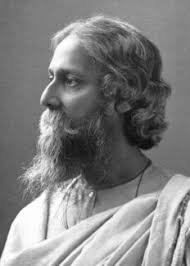Why in the News🤔?
On 1st April 2025, Visva-Bharati University in Santiniketan hosted an international seminar to mark the 100th anniversary of Rabindranath Tagore’s visit to China (1924) and the 75th anniversary of diplomatic relations between India and China.
- The event was held at Cheena Bhavana of the Visva-Bharati University, South Asia’s oldest Chinese studies department.

- The event was held at Cheena Bhavana of the Visva-Bharati University, South Asia’s oldest Chinese studies department.

Who was Rabindranath Tagore, and what were his contributions to nation-building?
- Rabindranath Tagore, born in Calcutta on 7th May 1861, was a Bengali poet, novelist, playwright, musician, painter, philosopher, and educationist.
- He was popularly known as Gurudev, Kabiguru, and Biswakabi.
- Tagore was a good friend of Mahatma Gandhi and is said to have given him the title of Mahatma (the Great Soul).
- Mahatma Gandhi was the first person to call Tagore “Gurudev” and referred to him as “poet of the world”.
- He became the first non-European to win the Nobel Prize in Literature (1913) for his work Gitanjali.
Tagore’s Contribution to Nation-Building
- Views on Nationalism: His idea of nationalism was both inclusive and spiritual. He believed nationalism should elevate human values, not breed hatred or extreme patriotism.
- Tagore’s patriotism was ethical and moral, rooted in universal humanism, respect for cultures, and inter-civilisational dialogue.
- He emphasized that India’s strength lay in its diversity and unity, not in uniformity or religious majoritarianism.
- Tagore’s nationalism was cosmopolitan, not isolationist, which is relevant even today in times of rising ethnonationalism.
- In his book Nationalism (1917), he warned against Western-style aggressive nationalism, calling it a threat to peace and global harmony.
- Contribution to the National Movement of India: Though not an active political agitator, Tagore played a moral and intellectual role in India’s freedom struggle. During the Partition of Bengal (1905), he supported the Swadeshi movement, composing songs (Amar Sonar Bangla) to encourage unity and self-reliance.
- A major turning point came after the Jallianwala Bagh Massacre (1919) when he renounced the knighthood awarded by the British.
- The song Jana Gana Mana, the National Anthem of India, was originally written and composed in Bengali by Rabindranath Tagore.
- Contribution in Music, Dance, and Art: Tagore was a cultural revivalist who gave India a distinctive identity in global aesthetics.
- He composed over 2,000 songs, collectively known as Rabindra Sangeet, known for their lyrical depth and emotional richness.
- His music blended classical ragas, folk traditions, and spiritual themes, with songs like ‘Ekla Chalo Re’ becoming part of nationalist symbolism.
- He created dance dramas like Chitrangada, Shyama, and Chandalika, merging theatre, music, and classical Indian dance.
- As a painter, he introduced abstract and symbolic expression, challenging colonial artistic norms and emphasizing Indian visual identity.
- Contribution to Literature: He modernised Bengali prose and poetry while engaging with themes of freedom, identity, spirituality, and modernity. His major works include:
- Poetry: Gitanjali, Balaka, Sonar Tori, Manasi
- Novels: Ghare-Baire, Gora, Chokher Bali
- Plays: Chitra, The Post Office
- Essays: Sadhana: The Realisation of Life, The Religion of Man, Nationalism.
- Contribution in Education: Tagore envisioned education as a means to liberate the mind, not control it. In 1921, he founded Visva-Bharati University at Santiniketan, built on the philosophy of ‘learning in harmony with nature. ’
- Visva-Bharati was a global centre of learning, with the motto “Yatra visvam bhavatyekanidam” (Where the world meets in one nest).
- In 1937, he established Cheena Bhavana to foster Indo-Chinese civilizational ties and global cultural dialogue.
Conclusion
Rabindranath Tagore was not merely a poet but was a visionary, reformer, and global thinker who redefined India’s cultural identity and intellectual future. His contributions to the freedom movement, art, education, and international diplomacy laid the foundation for modern India’s soft power and moral leadership.
Source Drishti IAS get to know more and useful for UPSC and state PSC. The Hindu News

0 Comments